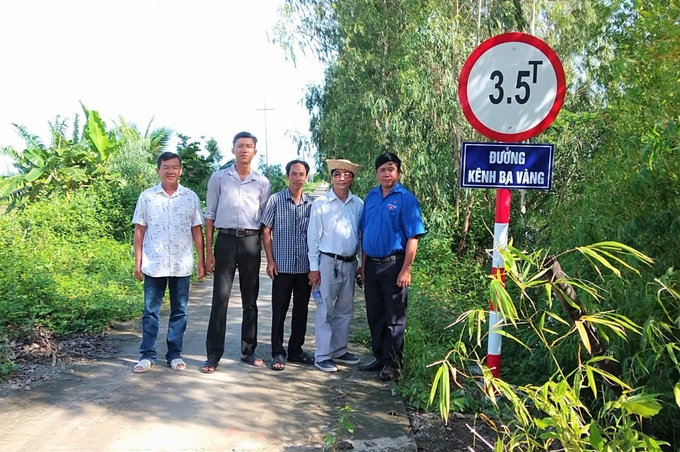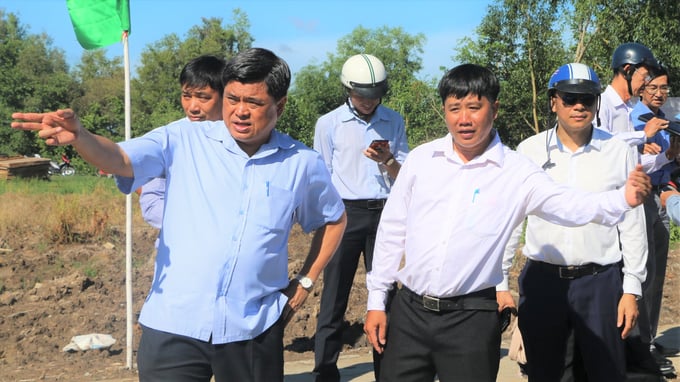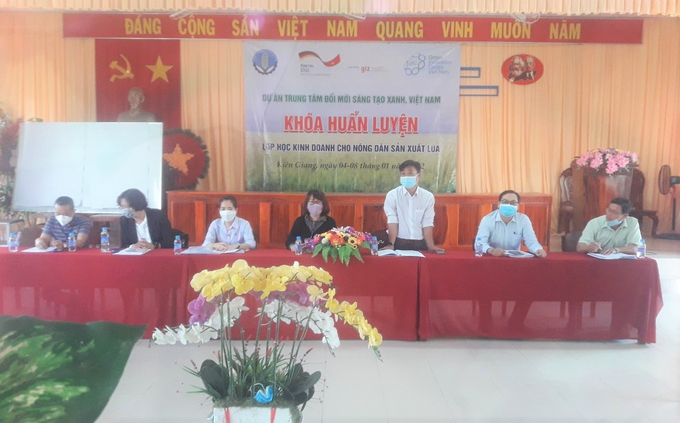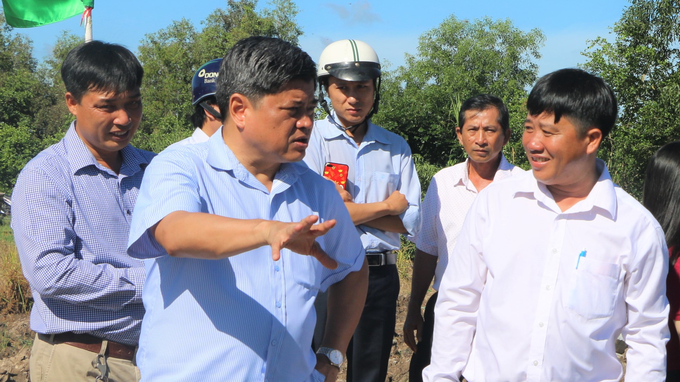May 29, 2025 | 16:05 GMT +7
May 29, 2025 | 16:05 GMT +7
Hotline: 0913.378.918
May 29, 2025 | 16:05 GMT +7
Hotline: 0913.378.918

Director of Phu Hoa Cooperative Nguyen Van Huynh (first right) and other members of the cooperative pictured at an infrastructure project for sustainable rice production, sponsored by the VnSAT project.
Located in Tan Hiep District, Kien Giang Province, Tan Hoi Commune has a total area of 3,936 hectares of rice, 51 hectares of orchards, 15 hectares of crops, 5 hectares of livestock and aquaculture.
The commune has 5 active cooperatives, of which the Phu Hoa Youth Agricultural Service Cooperative currently has 320 members and 615 hectares (accounting for 32% of the commune's rice area) growing high quality rice brands, together with 5 hectares of fruit trees, 7 hectares of vegetables and livestock.
According to Nguyen Van Huynh, Director of Phu Hoa Youth Agricultural Service Cooperative (Phu Hoa Cooperative), the main source of income of Phu Hoa cooperative mainly comes from agricultural production.
However, the conventional production of the cooperative lacked linkage, has unstable output and stable income. Moreover, information about the cooperative's products was not widely known to enterprises and consumers.
Currently, the trend of organic farming is a new effort to increase farmers' incomes by meeting the growing demand for healthy food and avoiding the health risks caused by agricultural chemicals.
Particularly, the biggest benefit of organic farming is environmental protection. Following the trend, Phu Hoa Cooperative has boldly applied the organic rice production process.

Deputy Minister of Agriculture and Rural Development Tran Thanh Nam (first left) during the ceremony of handing over infrastructure works for sustainable rice production to Phu Hoa Cooperative, sponsored by VnSAT project .
According to Huynh, Phu Hoa Cooperative has implemented organic rice production on an area of 50 hectares since the winter-spring crop 2021-2022 and will continue to implement the method in the summer-autumn crop of 2022. Transforming organic production, through direct connection to businesses for rice consumption, helps the cooperative to shorten the chain and increase its rice price.
Specifically, the price of each kilo of rice has increased by VND500 - 1,000, meaning that each hectare of rice with a minimum yield of 5 tons/ha/crop will increase the farmers’ income from VND2.5 to 5 million /ha.
From such results, Phu Hoa Cooperative is continuing to deploy and expand the organic rice production area to 200 hectares in the Winter-Spring crop 2022-2023, aiming to expand to the entire area of the cooperative members.

To conduct the digital transformation in organic rice production, the Management Board of Phu Hoa Cooperative participate in the project of Green Innovation Centre for the Agricultureand Food Sector in Viet Nam – GIC, sponsored by German Organization for International Cooperation (GIZ).
Moreover, the Management Board of Phu Hoa Cooperative also boldly proposed ideas and planned to adopt digital transformation in organic rice production through the transparency of the production process and the traceability using QR code, with the aim to seek opportunities to connect rice consumption.
According to Director of Phu Hoa Cooperative, Nguyen Van Huynh, applying digital technology in production will help rice farmers to easily and quickly record the production diaries via smartphone softwares. It also enables the consumers, wherever they are, to access information about the cultivation process, fertilizer and medicine dosage as well as images of rice preliminary processing, which helps to build mutual trust for long-term cooperation. This is also the first step for Phu Hoa Cooperative to register for the planting area code to access the international market.
Implementing organic rice production helps the cooperative's products to easily access the market in the trend of clean and organic consumption and registering for planting area codes aims to prepare for export opportunities. In the long term, Phu Hoa Cooperative gradually builds its brand name and has its own distribution channel through various e-commerce platforms to reach the last consumers. Thus, the cooperative could maintain a sustainable development.
The director of Phu Hoa Cooperative assessed that using digital technology helps farmers save time and have the opportunity to increase income from other models such as raising livestock, growing vegetables, and taking care of gardens. Applying the organic process reduces the use of chemicals and environmental pollution, thereby protecting consumers' health and improving the living environment. It can be said that the biggest benefit of organic farming is dedicated to the environment.

Deputy Minister of Agriculture and Rural Development Tran Thanh Nam (2nd from left) talks with the Director of Phu Hoa Cooperative Nguyen Van Huynh (first right ) about building and developing a new model of cooperative.
Operating under the new cooperative model of rice production and trading, Phu Hoa has gathered farmers to produce on a large scale. The cooperative has represented farmers to sign contracts and associate with businesses, thereby offering common services such as supplying agricultural materials, protecting plants, drying, preservation, temporary storage and finding outputs for products, which has helped reduce costs and increase income for each farmer household.
Regarding the digital transformation in production and business management, it is necessary to change the perception of cooperative members in the application of new and modern technologies. The building of material areas with growing area codes, traceability and the introduction of products on e-commerce platforms specializing in agricultural products are also important.
In addition, Phu Hoa Cooperative has also been facilitated by the functional sector to promote training and transfer of scientific and technical advances to farmers to increase the rate of application of technical advances, the technique of "3 decrease - 3 increase", "1 must - 5 decrease", rice production according to GAP and organic process.
The unit continues to accelerate the application of mechanization in production to reduce post-harvest losses and costs, increase production efficiency and income for its members.
Translated by Phuong Ha

(VAN) FAO’s Director-General addresses the 5th Baghdad International Water Conference.
/2025/05/26/1716-4-nongnghiep-191706.jpg)
(VAN) Chain linkages, technological innovation, and raw material zoning are three strategic pillars for the coconut industry to strongly develop and elevate its position on the global agricultural map.
![Advanced mariculture – an inevitable trend: [4] Accompanied by scientists](https://t.ex-cdn.com/nongnghiepmoitruong.vn/608w/files/sohk/2025/05/13/1941-pgsts-vo-van-nha-140958_717.jpg)
(VAN) According to Assoc. Prof. Dr. Vo Van Nha, Director of the RIA III, the development of advanced offshore mariculture is no longer an option but an essential path for Vietnam’s fisheries sector.

(VAN) Vietnam is intensifying the development of mollusk farming areas that meet international standards, aiming for sustainable growth and enhancing its export position in the global seafood market.
![Advanced mariculture – an inevitable trend: [3] Policy-driven momentum](https://t.ex-cdn.com/nongnghiepmoitruong.vn/608w/files/doanhtq/2025/05/21/0104-0616-0348-nuoi-bien-170339_789.jpg)
(VAN) To ensure the success of offshore mariculture that uses advanced technologies, it is essential to establish supportive policies that inspire both individuals and enterprises to invest with confidence.
![Advanced mariculture – an inevitable trend: [2] Outstanding results](https://t.ex-cdn.com/nongnghiepmoitruong.vn/608w/files/sohk/2025/05/12/4632-4136-nuoi-bien-11-164117_819.jpg)
(VAN) Pilot models of high-tech offshore mariculture in Vietnam, particularly in the South Central Coast region, have demonstrated exceptional economic returns and sustainability, setting a new direction for the country’s aquaculture industry.
![Advanced mariculture – an inevitable trend: [1] Moving offshore](https://t.ex-cdn.com/nongnghiepmoitruong.vn/608w/files/phucpm/2025/05/18/0252-2436-nuoi-bien-6-162148_783.jpg)
(VAN) Mariculture using advanced technology and moving offshore is an inevitable trend, as nearshore areas increasingly reveal limitations.